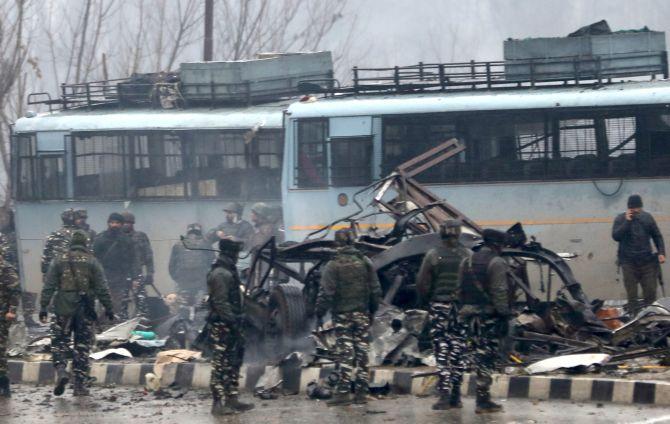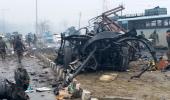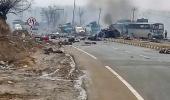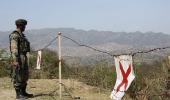'The military aim should be to inflict punishment on the Pakistan army for every act of terrorism on Indian soil for which there is credible evidence of its involvement,' says Brigadier Gurmeet Kanwal (retd).

There is a time for restraint and there is a time for action. This is a time for action, not restraint.
A troop-carrying vehicle in a CRPF convoy was attacked by a car-borne suicide bomber belonging to the Pakistan army and ISI-sponsored Jaish-e-Mohammad near Letipura, Pulwama, in the Kashmir valley on February 14, 2019. Approximately 40 CRPF personnel were killed and many others were seriously injured.
The attack near Pulwama is a point on a continuum: A low-intensity limited war on the Line of Control since 1947-1948 and a three-decade-old proxy war to bleed India through a thousand cuts through State-sponsored terrorists and support for disaffected elements in the Kashmir valley.
How should India respond to this grave provocation that is unquestionably beyond India's threshold of tolerance?
The response will be guided by an assessment of the situation, the aim to be achieved, options available and the likely reaction of the Pakistani Deep State, its allies and the rest of the international community.
It is clear as daylight that Pakistan's quest to destabilise India and keep the pot boiling in Kashmir will not change.
India's response should be swift, but with long-term objectives, multi-disciplinary in approach, comprising military and non-military, overt and covert actions and carefully calculated to avoid untoward military escalation.
The Cabinet Security on Security met on the morning of February 15th and took stock of the situation. The armed forces have been given a free hand to formulate appropriate retaliation strategies.
The government has decided to isolate Pakistan internationally as a State sponsor of terrorism and, as a first step, announced the withdrawal of 'most favoured nation' status accorded to Pakistan.
It is necessary to formulate a comprehensive long-term national-level strategy to counter Pakistan's proxy war. The political aim should be to raise the cost for Pakistan's Deep State to wage its proxy war with a view to eventually making the cost prohibitive.
The aim of Indian diplomacy should be to isolate Pakistan in the international community and work towards having the country branded as a terrorist State by the UN security council. India should take the first step in this regard and make a declaration to this effect.
If necessary, India should withdraw its high commissioner from Islamabad and scale down the size of its mission. Other measures, including those pertaining to a review of the Indus Waters Treaty, must also be considered.
The aim of measures in the economic field should be to choke Pakistan's economy, which is the nearly bankrupt Pakistani State's weakest element. The imposition of unilateral economic sanctions is a measure that India could consider especially if the UN security council fails to impose such sanctions at India's request.
India could also use its buyer's clout with defence MNCs to ensure that companies that sell weapons and defence equipment to India refrain from doing business with Pakistan.
The military aim should be to inflict punishment on the Pakistan army deployed on the LoC for every act of terrorism on Indian soil for which there is credible evidence of its involvement or the involvement of its organs such as the ISI.
For each subsequent act of terrorism, the scale and the intensity of the dose should be increased by an order of magnitude.
Military operations designed to inflict punishment should include artillery strikes with guns firing in the 'pistol gun' mode to destroy bunkers on forward posts with minimum collateral damage; stand-off PGM strikes on brigade and battalion HQ, communications centres, logistics infrastructure, ammunition dumps and key bridges; and, raids by Special Forces and border action teams.
Every Pakistani post through which infiltration takes place should be reduced to rubble by artillery fire.
The use of air strikes, particularly those with precision-guided missiles launched from stand-off range on the Indian side of the LoC, on terrorist training camps and infrastructure in POK, is also a viable military option.
Counter-proxy war operations should be supplemented by covert operations. Since the remaining roots of militancy are now in Pakistan and Pakistan occupied Kashmir and Pakistan is not inclined to bring to justice the leaders of terrorist organisations like the Lashkar e Tayiba and the Jaish e Mohammed, terrorists whom they call 'strategic assets', they must be neutralised through covert operations.
When the Pakistan army begins to hurt and bleed, gradually the Deep State will realise the futility of its nefarious designs on India.
While Pakistan may not give up its claims on Jammu and Kashmir, it will be forced to come to the negotiating table to discuss a long-term solution to the dispute through peaceful means.
In the wake of the Pulwama suicide bombing, India stands united as a nation; its political parties stand together. India has the support of almost the entire international community as the world is tired of the crippling impact of fundamentalist terrorism.
Brigadier Gurmeet Kanwal (retd) is a former Director, Centre for Land Warfare Studies (CLAWS), New Delhi.











 © 2025
© 2025